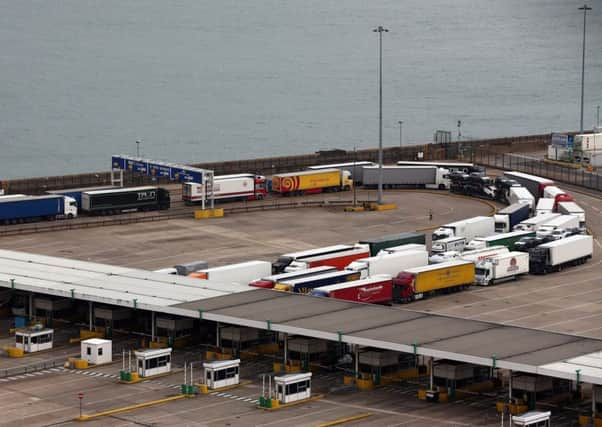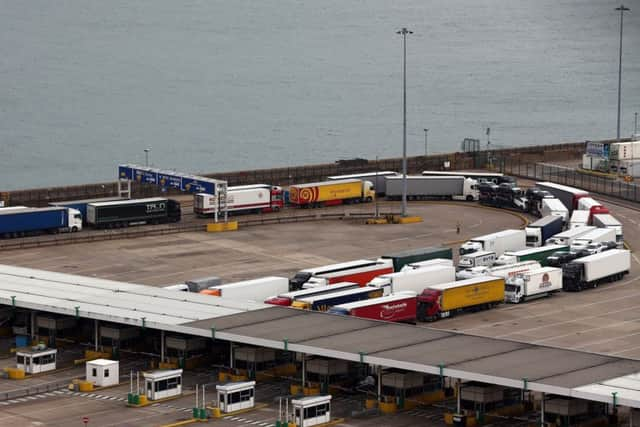Brian Wilson: Fundamentalists forced '˜bonkers' Brexit deadline on May


That really is the current problem of perception. While resenting the inconvenience, the vast majority of those who voted Remain are reconciled to some sort of EU withdrawal and are not going out of their way to get excited about it. All we – for I place myself in that category – require is evidence that things are proceeding to plan or, indeed, that a plan exists to deliver a reasonable outcome. Day by day, the confusions and contradictions which emerge sap confidence in that reasonable expectation.
On the face it, the whole thing is in chaos. While the focus of government should be on securing optimum terms of withdrawal from the EU, an impression prevails of a rudderless ship of state, buffeted from myriad directions, with a Prime Minister who has lost the power to command.
Advertisement
Hide AdAdvertisement
Hide AdWhile all that may be true, I doubt if it is the full story. The UK government is a vast machine and most of it operates out of sight. I do not doubt that meaningful, constructive discussions are taking place on many fronts between Whitehall and Brussels.


The more that work remains unseen, the better, since the inevitable consequence of it coming into public view would be denunciation from some quarter as perfidy or surrender and another pointless distraction will emerge. In fact, the only perfidy will be if such engagement does not exist.
I live in a part of the UK where negative implications of EU withdrawal are balanced by opportunities. Sometimes it seems that responsibility for the opportunities is feared more than the consequences. I can’t think of a job in government I would like more than to draw up a blueprint for Scotland’s most peripheral areas based on our own priorities rather than EU directives. The same principle could be applied in many contexts. The EU is primarily about facilitating the free movement of capital and labour which is not, inherently, a driver for progressive change. Fair enough, I prefer the comfort of that framework, warts and all, but that need not lead to denial of the potential for creative politics based on withdrawal. Let’s just get on with it.
I hope that sets out a reasonably balanced background against which to join those, of all parties, who think the announcement by Mrs May that, come hell or high water, we will leave the EU at 11pm on 29 March, 2019, is bonkers. The only defence would be that it is meaningless and I hope that is the case. A stark example of why date-setting is a misguided exercise emerged from this week’s report by the Commons’ Public Accounts Committee on the subject of post-Brexit customs arrangements. The statistics are startling.
According to HMRC, when Britain leaves the EU there will be 132,000 businesses required to make Customs declarations for the first time, almost doubling the current number. HMRC is putting in place a new Customs Declaration Service to handle 255 million declarations a year and is “reasonably confident” of completion by January 2019 – two months before the sacred date.


That outcome is entirely dependent on the technology. The committee concluded that HMRC is “managing an unsustainable amount of change that could put delivery of the Customs Declaration Service at risk”.
And what would be the practical consequences of delay, which is scarcely unknown with big transitional projects of this nature? The Port of Dover told the committee that it alone processes 10,000 freight vehicles every day – equivalent to a 180km queue. The committee noted: “Any issues which lead to delays in processing this traffic could result in queues building up and trucks filled with rotting food … impacting on the UK’s global reputation”. HMRC described this scenario as “catastrophic”.
So fast forward to January 2019 when a brave official informs the Prime Minister that the new Customs Declaration Service has hit a severe glitch and is incapable of reliable implementation for six months, a year, whatever … what will be the response? “Bonfires must be lit across the land at 11pm on March 29 so let the queues form and the food rot”? Similar objections exist on many fronts. The negotiations under way may be incapable of meeting an artificial deadline that is, now, just 16 months away – the same time as has passed since the referendum. On the genuinely difficult problem of the Irish border, for instance, if no solution is finalised, will chaos simply be dumped on Larne and Cairnryan?
Advertisement
Hide AdAdvertisement
Hide AdTarget dates are useful but deadlines are daft. So why has Mrs May set one? The answer surely lies in appeasing Brexit fundamentalists who are not remotely interested in lorry queues, rotting food or any other practical issues that affect businesses, livelihoods and well-being. As we know in Scotland, those who have devoted their lives to a single cause regard such objections as trivial footnotes of history. Mrs May seems trapped by this need for “balance”. When she seeks a new Secretary of State, it is not the best man or woman for the job.
The first criterion is whether the appointment maintains a Brexit balance. When she needs a bone to throw to fundamentalists, she offers a fixed date that ignores realities of negotiating under duress.
Her position is reminiscent of John Major’s plight a quarter of a century ago and some of the same personnel are still around – Duncan Smith, Redwood, Cash. In the 1990s, they were prepared to bring down their own government and ultimately played a large part in doing so. This is the mentality Mrs May is now trying to “balance” against national interest.
There is a clear majority in the Commons for an approach to Brexit which secures the best outcome for British jobs and society, even if it takes a bit longer. That is the consensus Mrs May should seek rather than remaining hostage to the unappeasable within her own ranks. Otherwise, they they will turn the screw and then see her off in their own time.